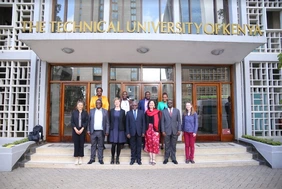As part of the SEED project, a two-week field visit to Kenya took place in December 2022: Besides Mozambique, Kenya is the second country in which the concept of the Energy-Hub is being planned together with the SEED project partners. It was not only possible to escape the freezing temperatures of Germany, but also to make considerable project progress: In addition to the meeting with the project partners from the Technical University Kenya (TU-K), the visit to the informal settlement and research region Kingstone in the urban area and slum of Mukuru was particularly on the agenda. The focus of the stay was on visiting the potential site for the Energy-Hub, analysing the existing local infrastructure, measuring electronic devices from companies in the neighbourhood and establishing contacts with various relevant stakeholders. The visit to the settlement was accompanied by a local guide who assisted in translating Kiswahili or a language of the respective ethnic groups into English. The first contact with small businesses was also made much easier thanks to the guide.
With the help of a current clamp, measurements of various electrical devices of local companies could be taken. The purpose of this is to get a feel for the types of businesses on site, the number of devices in operation and an overview of the resulting electricity demand of each business. Once the services offered in the Energy-Hub are determined after future, further research, the sizing will be simplified by the data collected during this visit. Businesses analysed included butchers, milk, fish and vegetable sellers, grain millers, hairdressing and laundry salons, as well as electronics- grocery and sewing shops.
Electricity supply in Kingstone is organised by informal energy suppliers. The national energy provider KPLC has withdrawn from the region by dismantling all transformers in order to counteract illegal structures that have already developed and to minimise economic losses that have arisen as a result. Residents of Kingstone now do not pay for the energy they use each month, but a fixed amount depending on the capacity of the connected power line. For the residents, this results in both high prices and an unreliable power supply. In particular, blackouts often occur in the evening hours, as a relatively large amount of electricity is needed during this time. As shopping and errands are often done in the evening hours after a long working day, businesses in particular suffer from lost sales due to the evening power cuts: hairdressing salons with electric razors cannot serve customers, sewing shops and laundries cannot do their work.
The lack of street lighting and the resulting lack of security after sunset in Kingstone was also identified as another major challenge. An Energy-Hub can provide light, and therefore safety, to residents during dark hours with the help of portable, solar-based lighting. Selected businesses that support as much of the local population as possible in their daily lives can also benefit from a stable electricity supply through the Energy-Hub.
Contact was successfully established with various stakeholders such as the Muungano Alliance. The organisation supports the process of Mukuru Slum Upgrading, i.e., the upgrading of the region through infrastructure development and restructuring. Especially in the field of energy infrastructure optimisation, a cooperation between the organisation and SEED is seen as profitable for all parties. The cooperation with the NGO Mukuru Slums Development Project (MSDP), which provides the potential location for the energy hub, was also deepened in various meetings.
The findings of the research visit will be discussed with all project partners at the project meeting in Nairobi in February 2023. The future cooperation with stakeholders will also be consolidated at the project meeting.
The SEED project is funded by DLR with funds from the Federal Ministry of Education and Research (BMBF) and will run until the end of March 2024. For further, project-related information, please visit our website.





![[Translate to English:] Logo Akkreditierungsrat: Systemakkreditiert](/fileadmin/_processed_/2/8/csm_AR-Siegel_Systemakkreditierung_bc4ea3377d.webp)








![[Translate to English:] Logo IHK Ausbildungsbetrieb 2023](/fileadmin/_processed_/6/0/csm_IHK_Ausbildungsbetrieb_digital_2023_6850f47537.webp)


